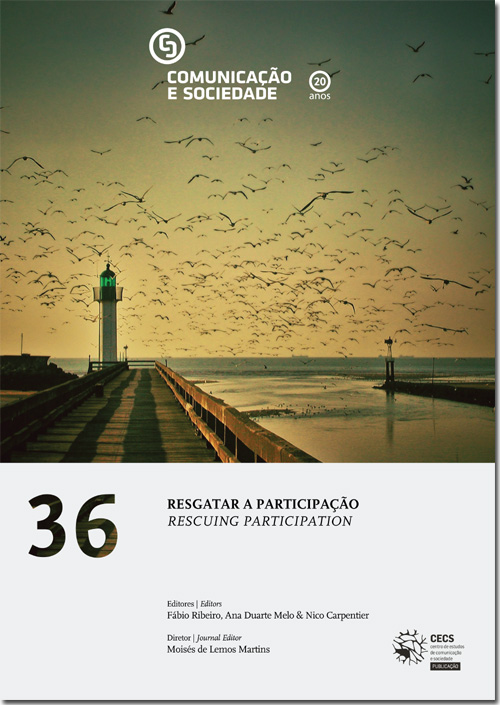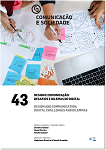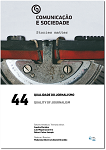Participação efetiva com recurso a narrativas negociadas
DOI:
https://doi.org/10.17231/comsoc.36(2019).2351Palavras-chave:
narrativas, participação, storytelling, transmédia interativos, websérieResumo
Este artigo analisa o projeto “Red Branch Heroes”, um protótipo interativo e transmédia, lançado na Irlanda do Norte. Este projeto de investigação ação analisa as técnicas de escrita que podem ser utilizadas para promover uma participação eficaz. O artigo sugere uma forma de participação que reconhece os equilíbrios de poder que existem entre o autor e as audiências em narrativas digitais. Defende uma série de técnicas que promovem uma maior partilha desse poder, para que essas posições de poder sejam desafiadas. Mas também defende o papel do autor como o de um condutor ou orquestrador, papel este que é definido por um processo de negociação. Tal processo resulta numa “narrativa negociada”.
Downloads
Referências
Abercrombie, N. & Longhurst, B. (1998). Audiences. Londres & Thousand Oaks: Sage.
Alderman, N. (2015, 13 de outubro). The first great works of digital literature are already being written: they’re called games. The Guardian. Retirado de https://www.theguardian.com/technology/2015/oct/13/video-games-digital-storytelling-naomi-alderman
Allen, D., Bailey, M., Carpentier, N., Fenton, N., Jenkins, H., Lothian, A., Qiu, J. L., Schäfer, M. T. & Srinivasan, R. (2014). Participations: dialogues on the participatory promise of contemporary culture and politics. International Journal of Communication, 8, 1129-1151.
Anderson, B. (1983). Imagined communities: reflections on the origin and spread of nationalism. Londres: Verso Books.
Arendt, H. (1958). The human condition. Chicago: University of Chicago Press.
Arthur, C. (2006, 20 de julho). What is the 1% rule? The Guardian. Retirado de https://www.theguardian.com/technology/2006/jul/20/guardianweeklytechnologysection2
Barthes, R. (2001). The death of the author. In J. Caughie (Ed.), Theories of authorship (pp. 208 -213). Londres: Routledge.
Berger, J. (1979). Ways of seeing, Londres: Pelican/Penguin Books.
Cooke, B. & Kothari, U. (Eds.) (2001). Participation: the new tyranny? Londres: Zed Books.
Coulter, C. & Shirlow, P. (2019). From the “Long War” to the “Long Peace”: an introduction to the special edition. Capital and Class, 43(1), 3-21. https://doi.org/10.1177/0309816818818084
Dawson, G. (2019). Storytelling in “post-conflict” times: narrative, subjectivity and experience in community-based peacebuilding. In S. Lehner & C. McGrattan (Eds.), The promise of peace in Northern Ireland. Manchester: Manchester University Press.
Dena, C. (2009). Transmedia practice: theorising the practice of expressing a fictional world across distinct media and environments. Tese de doutoramento, Universidade de Sidney, Sidney, Austrália.
Edge, S. (2009). Negotiating peace in Northern Ireland: film, television and post-feminism. Visual Culture in Britain, 10(2), 177-187. https://doi.org/10.1080/14714780902925051
Foucault, M. (1977). Language, counter-memory, practice. Nova Iorque: Cornell University Press.
Foucault, M. (1980). Power/knowledge. Nova Iorque: Pantheon Books.
Freshwater, H. (2011). “You say something”: audience participation and The Author. Contemporary Theatre Review, 21(4), 405-409. https://doi.org/10.1080/10486801.2011.610308
Gaver, B., Dunne, T. & Pacenti, E. (1999). Design: cultural probes. Interactions, 1(1), 21-29.
Gomez, J. (2011). Storyworlds: the new transmedia business paradigm. Comunicação apresentada no evento “Tools of Change for Publishing conference (TOC)”, Nova Iorque.
Habermas, J. (1991). The structural transformation of the public sphere. Cambridge, Massachusetts: MIT Press.
Heidemann, B. (2016). Post-agreement Northern Irish literature: lost in a liminal space? Londres: Palgrave Macmillan.
Jeffers, A. (2017). Authority, authorisation and authorship. In A. Harpin & H. Nicholson (Eds.), Performance and participation: practices, audiences, politics (pp. 209-229). Londres: Palgrave Macmillan.
Jenkins, H. (2006). Convergence culture. Nova Iorque: New York University Press.
Jenkins, H. (2012). Textual poachers: television fans and participatory culture, updated twentieth anniversary edition. Nova Iorque: Routledge.
Kelly, O., Lock, J. & Merkel, K. (1986). Culture and democracy: the manifesto. Londres: Comedia.
Kligler-Vilenchik, N. (2018). Why we should keep studying good (and everyday) participation: an analogy to political participation. Media and Communication, 6(4), 111-114. http://dx.doi.org/10.17645/mac.v6i4.1744
Le Hunte, B. & Golembiewski, J. (2014). Stories have the power to save us: a neurological framework for the imperative to tell stories. Arts and Social Science Journal, 5(2), 73-76. http://dx.doi.org/10.4172/2151-6200.1000073
Lutz, C. & Hoffmann, C. (2017). The dark side of online participation: exploring non-, passive and negative participation. Information, Communication & Society, 20(6), 876-897. https://doi.org/10.1080/1369118X.2017.1293129
Madden, D., Cadet-James, Y., Atkinson, I. & Watkin Lui, F. (2014). Probes and prototypes: a participatory action research approach to codesign. CoDesign, 10(1), 31- 45. https://doi.org/10.1080/15710882.2014.881884
Manovich, L. (2001). The language of new media. Cambridge, Massachusetts: MIT Press.
Mattelmaki, T. (2005). Applying probes: from inspirational notes to collaborative insights. CoDesign, 1(2), 83-102. https://doi.org/10.1080/15719880500135821
McConnell, B. & Huba, J. (2006, 3 de maio). The 1% Rule: charting citizen participation. Church of the Customer Blog. [Post em blogue]. Retirado de https://web.archive.org/web/20100511081141/http://www.churchofthecustomer.com/blog/2006/05/charting_wiki_p.html
McGonigal, J. (2011). Reality is broken: why games make us better and how they can change the world. Nova Iorque: Penguin Press.
McKittrick, D. & McVea, D. (2012). Making sense of the troubles: a history of the Northern Ireland conflict. Londres: Penguin.
McQuaid, S. (2012). Trailblazers and cassandras: other voices in Northern Ireland. Nordic Irish Studies, 2(2), 71-93.
Miessen, M. (2010). The nightmare of participation. Berlim: Sternberg.
Millard, K. (2014). Screenwriting in a digital era. Hampshire: Palgrave Macmillan.
Nordin, G. & Holmsten, E. (2009). Liminal borderlands in Irish literature and culture. Pieterlen: Peter Lang.
O’Donnell, H. (1999). Good times, bad times: soap operas and society in Western Europe. Londres & Nova Iorque: Leicester University Press.
O’Neill, C. (1995). Drama worlds. Portsmouth: Heinemann.
Ofcom, The Office of Communications. (2013). Communications market report: Northern Ireland. Retirado de https://www.ofcom.org.uk/__data/assets/pdf_file/0021/40692/2013_cmr_northern_ireland.pdf
Pettitt, L. (2000). Screening Ireland. Manchester: Manchester University Press.
Phillips, A. (2012, 3 de julho). Transmedia storytelling, fan culture and the future of marketing. Retirado de http://knowledge.wharton.upenn.edu/article/transmedia-storytelling-fan-culture-and-the-future-of-marketing/
Quandt, T. (2018). Dark participation. Media and Communication, 6(4), 36-48. http://dx.doi.org/10.17645/mac.v6i4.1519
Rose, F. (2012). The art of immersion. Nova Iorque: W.W Norton & Company.
Ryan, M. (2001). Narrative as virtual reality: immersion and interactivity in literature and electronic media? Baltimore: John Hopkins University Press.
Said, E. (1978). Orientalism. Nova Iorque: Pantheon Books.
Singhal, A. (2006). Popular media and social change: lessons from Peru, Mexico, and South Africa. The Brown Journal of World Affairs, XIII(2), 259-269.
Singhal, A., Cody, M., Rogers, E. & Sabido, M. (2008). Entertainment-education and social change. Londres: Taylor and Francis.
Watson, T. (2001). Beyond managism: negotiated narratives and critical management education in practice. British Journal of Management, 12(4), 385-392. https://doi.org/10.1111/1467-8551.00216
Webster, M. & Buglass, G. (2005). Finding voices, making choices: creativity for social change. Nottingham: Educational Heretics Press.
Weiler, L. (2015a). Sherlock Holmes and the internet of things. Retirado de http://lanceweiler.com/sherlock-holmes-the-internet-of-things/
Weiler, L. (2015b). Sherlock. Retirado de https://sherlock.hackpad.com/Sherlock-Prototype-5215-icYVe3D9IXW
Zipes, J. (2011). The meaning of the fairy tale within the evolution of culture. Marvels & Tales, 25(2), 221-243.
Zuboff, S. (2018). The age of surveillance capitalism. Londres: Profile Books.
Zuboff, S. (2019, 20 de janeiro). Entrevista com John Naughton. The Observer, pp. 18-21.
Downloads
Publicado
Como Citar
Edição
Secção
Licença
Os autores são titulares dos direitos de autor, concedendo à revista o direito de primeira publicação. O trabalho é licenciado com uma Licença Creative Commons - Atribuição 4.0 Internacional.














